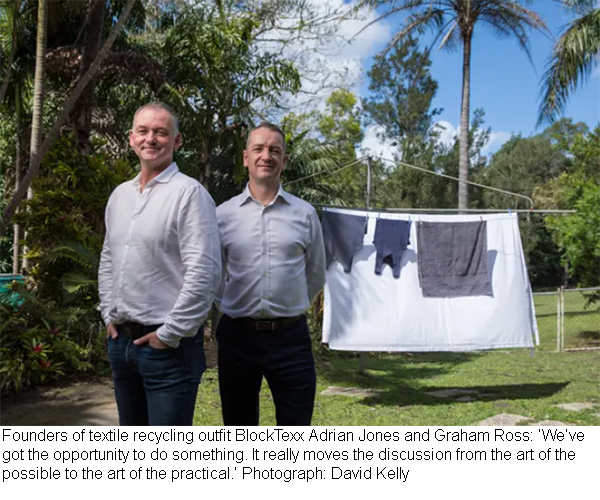
Category: General
Country: Australia
A world-first commercial plant designed to turn fabric into raw materials will also address the vast amounts of fast fashion heading for landfill
By: Ben Smee Sat 29 May 2021 21.00 BST
An Australian startup working on a process to recycle textiles by turning worn-out fabric into raw materials says it has funding to build a world-first commercial- scale plant in Queensland.
The federal government held a first national roundtable on textile waste on Wednesday – recognition of a piling-up problem that results in Australians discarding an estimated 780,000 tonnes of textile waste each year, according to a 2020 national waste report.
The problem is exacerbated by the lack of an effective recycling process. Studies show many large-scale garment recycling systems provide negligible benefits and can be as environmentally harmful as producing raw fabrics.
BlockTexx, an Australian company that has developed its process with researchers at the Queensland University of Technology, hopes it can help “close the loop” by diverting textiles from landfill, and at the same time replacing virgin material.
The company’s founders, Graham Ross and Adrian Jones, say the technology has been refined during the pandemic and they now have the $5.5m investment needed to build a first large-scale facility at Logan, south of Brisbane.
Ross and Jones – both veterans of the clothing and fashion industry – say they have enough supply and demand to expand, before the first plant has been built.
“From this original idea we always knew we were early to the market, but also a lot of technical barriers we need to overcome,” Ross said.
“We always seem to talk about textile waste. We always think about how can we take that and turn that into a valuable product.
“The byproduct is we’re solving environmental issues.”
Alice Payne, an associate professor at QUT and the program leader at the centre for a waste free world, said problems with textile waste have been accelerated since the 1980s by global trade policies. Lowered tariffs encouraged more imports. Cheaper fabrics allowed the phenomenon of “fast fashion” to flourish.
“Clothes are cheaper than ever – it’s possible to buy more and more,” Payne said.
“In parallel we’ve seen this stark rise in consumption of synthetic fibres. They’re low cost, they have an ease of consumption compared to natural fibres.
“When you blend a synthetic fibre with a natural fibre you create a monstrous hybrid. The common problem with all attempts at recycling is the more mixed material you have, the more problem you have reusing those resources.”
The process developed by BlockTexx and QUT researchers – called “separation of fabric technology” – is noteworthy because it is designed to handle hybrid fabrics. It turns cotton to cellulose and polyester to flake for industrial uses like injection moulding.
Their aim for the first plant is to recycle about 10,000 tonnes a year by the end of 2022 – initially focusing mostly on commercial fabrics, including old towels and
sheets from hotels and hospitals.
Ross said that after two years of lab testing, they were comfortable they could commercialise the process, and that it was producing raw recycled materials of very high quality.
“We’ve now got a product where we can consistently compare our product to virgin material,” he said.
The company would begin to recycle post-consumer waste when it scales up capacity. Plans have been drawn up for a 40,000-tonne plant. BlockTexx envisages licensing its technology on a global scale.
“[The size of the first plant] is significant, but equally only a drop in the ocean of the amount of textiles going to landfill,” Ross said.
“This is definitely a global model. The world has a textile problem. Our solution needs to go to the problem, because we can’t bring the problem to the solution.
“We see ourselves as a technology company. We already have several large waste and textile companies around the world saying this is really interesting.
“The other smart thing about our model is that it’s very modular – it can be run on a small scale and we can expand it.”
Jones said: “Whatever happens from now, because a solution exists, we can’t go backwards.
“I’m not trying to say that from tomorrow we’re not going to put textiles into landfill, we’re not going to export textile waste.
“But we’ve now got the opportunity to do something. It really does move the discussion from the art of the possible to the art of the practical and that’s really important in this space.”
Courtesy:
https://www.theguardian.com/environment/2021/may/30/recycling-textile-waste-a-solution-exists-we-cant-go-backwards
Copyrights © 2026 GLOBAL TEXTILE SOURCE. All rights reserved.